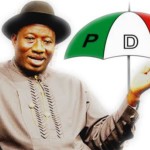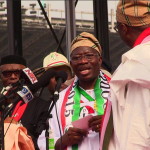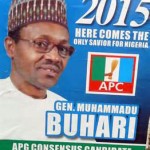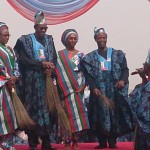Ibò ni gbogbo orilẹ̀ èdè Nigeria lati yan Olóri Òṣèlú àti Gómìnà fún agbègbè yio wáyé ni ọjọ́ Àbámẹ́ta, ọjọ́ kẹrinla, oṣù keji odun Ẹgbãlemẹ̃dogun.
- Olóri Òṣèlú Goodluck Jonathan ẹgbẹ́ Alágboòrùn – PDP Flag Bearer
- Ìpéjọ ẹgbẹ́ Alágboòrùn ni Èkó – PDP incumbent President Goodluck Ebele Jonathan’s rally in Lagos
- Olóri-ogun Muhammadu Buhari fún ẹgbẹ́ Onigbalẹ – General Muhammadu Buhari APC Flag bearer
- Ìpéjọ ẹgbẹ́ Onigbalẹ ni ìpínlẹ̀ Ògùn – APC Presidential flag bearer General Mohammed Buhari campaign in Ogun State
Ki i ṣe ẹgbẹ́ Òṣèlú meji ló wà ṣùgbọ́n ninú ẹgbẹ́ bi mejidinlọgbọn, ẹgbẹ́ Alágboòrùn àti Onigbalẹ ló mókè jù ninú ẹgbẹ́ yoku. Laarin ẹgbẹ́ meji yi, ibò lati yan Gómìnà fún àwọn ìpínlẹ̀ Yorùbá wọnyi yio wáyé ni: Èkó laarin Akinwunmi Ambọde àti Jimi Agbájé, Ògùn Gómìnà Ibikunle Amósùn àti Ọmọba Gbóyèga Nasir Isiaka, Ọ̀yọ́ laarin Gómìnà Aṣòfin-àgbà Abiọ́lá Ajimọbi àti Aṣòfin-àgbà Teslim Kọlawọle Isiaka. Kò si ibò ni ìpínlẹ̀ Ọ̀sun nitori Gómìnà Rauf Arẹ́gbẹ́sọlá gba ipò padà ni ọjọ́ kẹsan oṣù kẹjọ ọdún Ẹgbãlemẹrinla, nigbati Ekiti gba ipò lọ́wọ́ Gómìnà Olóye Káyọ̀dé Fayẹmi fún Gómìnà Ayọdele Fayoṣe ni oṣù kẹfa, ọjọ́ kọkànlélogún ọdún Ẹgbãlemẹrinla. Àsikò Gómìnà Olóye Olúṣẹ́gun Mimiko ti Ondo kò ni pari titi di ọdún Ẹgbãlemẹrindilogun.
Ó yẹ ki ará ilú ṣe àyẹ̀wò irú ẹni ti wọn fẹ́ dibò fún ki ọjọ́ idibò tó dé. Ọdún mẹrin-mẹrin ni idibò nwáyé lati ọdún mẹrindinlógún ti Ìjọba Alágbádá ti gba Ìjọba padà lọ́wọ́ Ìjọba-Ológun. Fún ọdún wọnyi, èrè diẹ ló wà fún àwọn ará ilú, nitori wọn fi ipò ti wọn gbà pa owó si àpò ara wọn. Dipò ki wọn fún ará ilú ni ohun amáyé-dẹrùn nipa ipèsè iná mọ̀nàmọ́ná, omi mimu, titi/òpópónà ọlọ́dà, ṣi ṣe òfin àti pipa òfin mọ lati din iwà burúkú bi àbẹ̀tẹ́lẹ̀ gbigbà kù àti iṣẹ́ ibi yoku, ṣe ni wọn mba nkan jẹ́ si.
Ọ̀rọ̀ Yorùbá ni “Wọn fi ẹ̀tẹ̀ silẹ̀ pa làpálàpá”. Ọ̀rọ̀ yi hàn nipa bi Òṣèlú ṣe npin owó àti irẹsi ti wọn ra lati òkè-òkun fún ará ilú ni gẹ́rẹ́ ti ibò bá mbọ̀ dipò ki wọn gbèrò ohun ti wọn yio ṣe fún ilú lati mú ayé dẹrùn bi wọn bá gba Ìjọba. Ó yẹ ki ará ilu funra si ẹni ti ó pin owó àti irẹsi nitori àti ra ibo.̀ Irẹsi àti owó ti wọn pin ni ọdún kẹrin sẹhin kò tó jẹ ju ọ̀sẹ̀ kan fún idile lai sọ ọdún mẹrin. Owó àti irẹsi yi kò tó nkankan lára owó ti wọn ji kó, eyi ti ó yẹ ki wọn fi pèsè ilé-iwé, omi mimu, ọ̀nà, iṣẹ́ fún àwọn ọ̀dọ́, ilé-iwòsàn ti ó dára, ohun ijà fún Ológun àti Ọlọpa lati dá àbò bo ilú àti bẹ͂bẹ͂ lọ. Nitori eyi, ki ará ilú ṣe àyẹ̀wò dáradára lati di ibò fún ẹni ti wọn bá rò pé yio tún ilú ṣe. Lágbára Ọlọrun, idibò yi kò ni tú ilú ká.
ENGLISH TRANSLATION
Election in Nigeria to elect the President and State Governors is coming up on Saturday, Fourteenth, February, 2015.
There are not only two parties in Nigeria, but out of about twenty-eight registered parties, two of these parties stand out – Peoples Democratic Party (PDP) and All Progressives Congress (APC). Out of the two parties, Governorship election will take place in some Western States such as: Lagos between Akinwunmi Ambode and Jimi Agbaje; Ogun between incumbent Governor Ibikunle Amosun and Prince Gboyega Nasir Isiaka and in Oyo between incumbent Governor (Senator) Abiola Ajimobi and Senator Teslim Kolawole Folarin. No Governorship election in these States: Osun because the incumbent Governor Rauf Aregbesola was re-elected on August nine, 2014; while Ekiti re-elected Governor Ayodele Fayose in place of Governor Kayode Fayemi on June twenty-one, 2014. The incumbent in Ondo State, Dr. Olusegun Mimiko will complete his term in 2016.
It is necessary for voters to find out more about nominated candidates before election. In the past sixteen years, election has been held every four years since Democratic Government took over from the Military Government. Since then there has been little dividend of democracy for the people, because the Politicians have been using their positions to embezzle public funds. Instead of providing the basic infrastructure such as steady power supply, potable water, roads, enact laws and obeying the laws to reduce evil act in the society such as corruption and other ills, they have been contributing to the destruction.
According to Yoruba adage that is translated as “Leaving leprosy for the cure of ring-worm” meaning leaving the important issue for the trivial. This adage is relevant to how the Politicians have been distributing money and imported bags of rice to canvass votes shortly before election instead of having a credible manifesto on moving the country forward. People should be wary of Politicians that share money and rice to attract votes. The cost of what they are sharing is nothing in comparison to the embezzled budgeted funds for infrastructure that could have been used to provide: public Schools; good roads, potable water; youth employment, well equipped hospitals, equipping the Military and Police to enable them protect the people etc. As a result of this, voters should ensure they cast their votes for Politicians that they believe would serve the best interest of the masses. By God’s grace the coming election will not scatter the country.
Originally posted 2015-01-27 22:11:09. Republished by Blog Post Promoter






